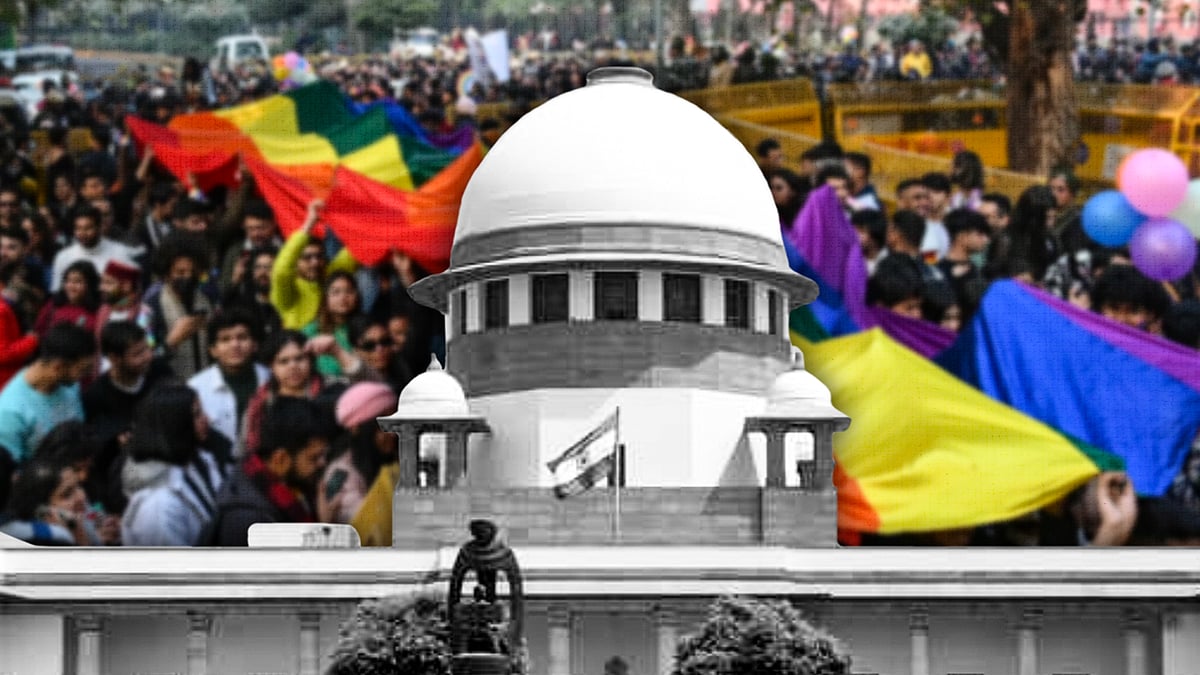‘Our voices will only get bolder’: Pride month begins at DU with North Campus parade
Participants said this was a chance for them to be their ‘authentic selves’.
Across the world, June is Pride month, and celebrations kicked off yesterday at Delhi University, where the Students’ Federation of India organised a pride parade at Arts Faculty, North Campus. Amid rainbow colours and joyous cheers, crowds of students marched at 3.40 pm, waving banners and placards advocating for love and equality.
Rusham, secretary of SFI Hindu College, said the university has been “stifling diverse and resistant voices”, so their aim is to “show that our voices will only get louder and bolder”.
“SFI Delhi, along with hundreds of queer-trans students, is showing the university and the government that we stand in solidarity with queer and trans struggles going on in the country,” she said.
For many participants, pride marches were a chance to reveal their authentic selves. Ravi Kumar, 23, said they “yearn” to reveal this side of themselves to family and friends, despite worries about the “weight of their potential reactions”.
“But in these moments of celebration and connection at Pride events, I’m reminded that happiness is found in embracing my true identity, regardless of the obstacles I may face along the way,” Ravi said.
Originally from Bihar, Ravi said that during the pandemic, while confined at home, they made the “incredibly challenging” decision to tell his friends about their identity. “Sadly, they distanced themselves from me, a reaction all too common in my village where my identity is labelled as bhimari, a disease.”
Ravi met their partner Rohit at a Pride event in January. Rohit told Newslaundry he’s kept his queer identity a secret from his family, confiding only in his sister.
“When I first revealed my truth to my sister, she was taken aback and tears filled her eyes,” Rohit said. “She expressed concern about how our parents would react and the tensions it might cause. It was challenging to help her understand but eventually she accepted me for who I am.”
North Campus echoed with similar stories. Pallavi, 22, is from Shimla where she “always felt constrained and unable to embrace my true identity”. “When I stepped foot in Delhi last November, it was like a breath of fresh air.”
Mercy, 22, also spoke about finding her people, a community of like-minded individuals, at college. A student of Miranda College at Delhi University, Mercy grew up in Manipur.
“Gender for me is fluid. I like to express myself in many different ways,” Mercy said. “Within my college space, people are incredibly welcome. They are genuinely happy to witness others celebrating their true selves, whether through their choice of attire or by raising their voices. It’s a safe haven for me.”
But not everyone found this safe haven. Raghavi Shukla, 25, graduated from Faculty of Law and “my experience within the campus was horrendous, with a complete lack of support from the administration”. Raghavi remembered being on the receiving end of transphobic slurs and derogatory language, something they’d also experienced while growing up in Kanpur.
Also at the event was Venkatesh Kodukula, an LGBTQIA+ rights activist from Visakhapatnam who currently works as an HR professional in Delhi. On the sidelines of the Pride march, they explained their journey to Newslaundry.
“I identified as gay eight years ago and later as a non-binary trans person,” said Venkatesh. “I now feel more comfortable identifying as someone who exists beyond the confines of traditional gender binaries. However, achieving recognition and acceptance in society can be incredibly challenging.”
There’s an urgent need for change, Venkatesh said, and there is a “long way to go in securing our fundamental rights”. “As part of the LGBTQ+ community, we often face rejection and exclusion, depriving us of basic rights that others take for granted.”
Marginalised communities often face challenges in accessing so-called inclusive spaces too. “Does the university have a gender-neutral washroom?” they pointed out. And while airlines persist in using gendered language like “ladies and gentlemen” while displaying rainbow flags in June, “do you have trans people as air hostesses?”
The parade ended with cultural performances by Dastak, a students’ forum. “It was a vibrant expression of identity and resistance to queerphobia,” said Mehina Fathima, who heads the SFI Delhi Queer Subcommittee. “We shall not conclude our movement with the Pride parade alone. There are a lot of campaigns coming up to make our campuses more progressive and inclusive.”
Some names changed to protect identities.
 A legal fight and a dream: What marriage means to India’s queer community
A legal fight and a dream: What marriage means to India’s queer communityNL Digest
A weekly guide to the best of our stories from our editors and reporters. Note: Skip if you're a subscriber. All subscribers get a weekly, subscriber-only newsletter by default.
